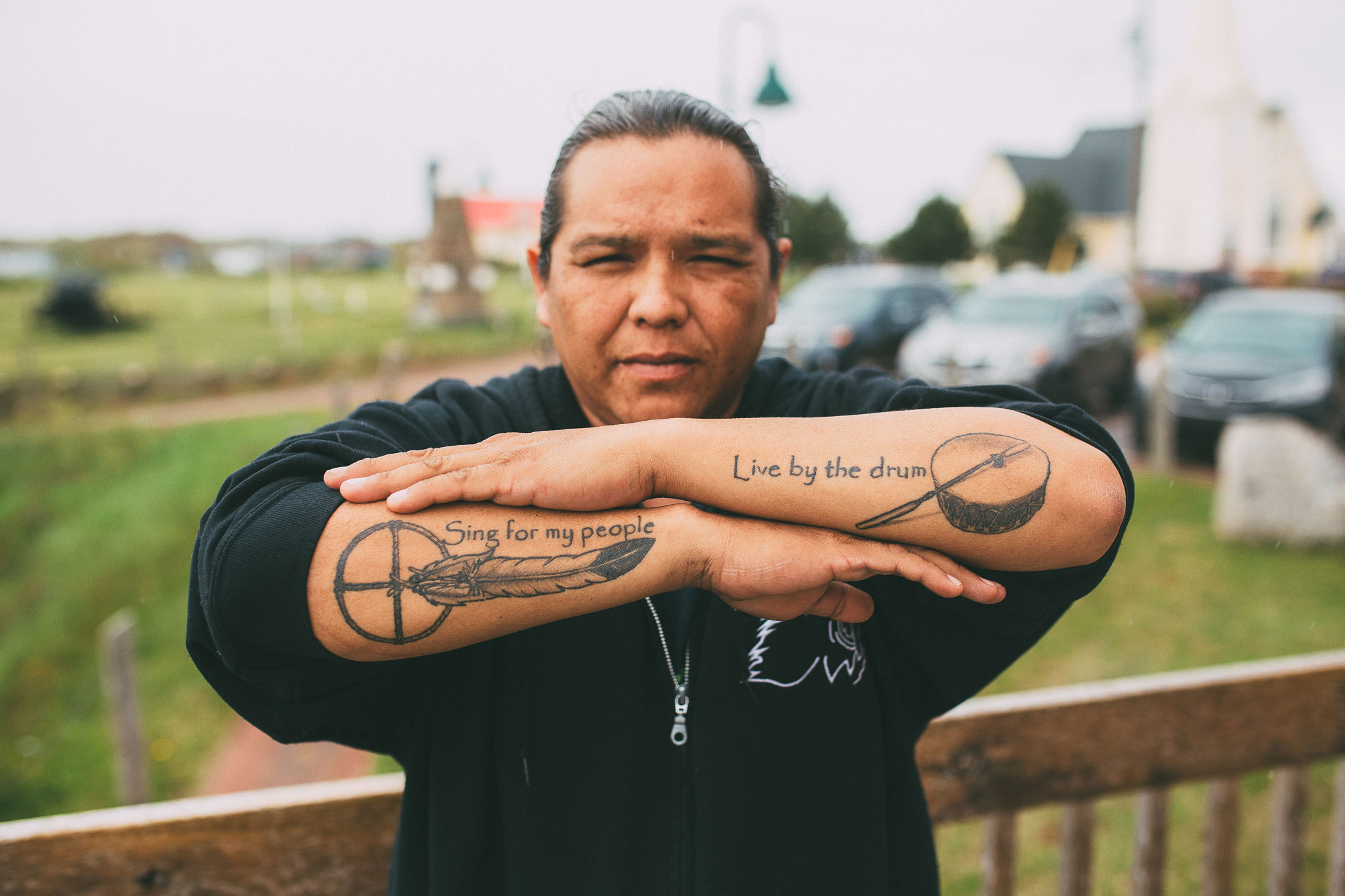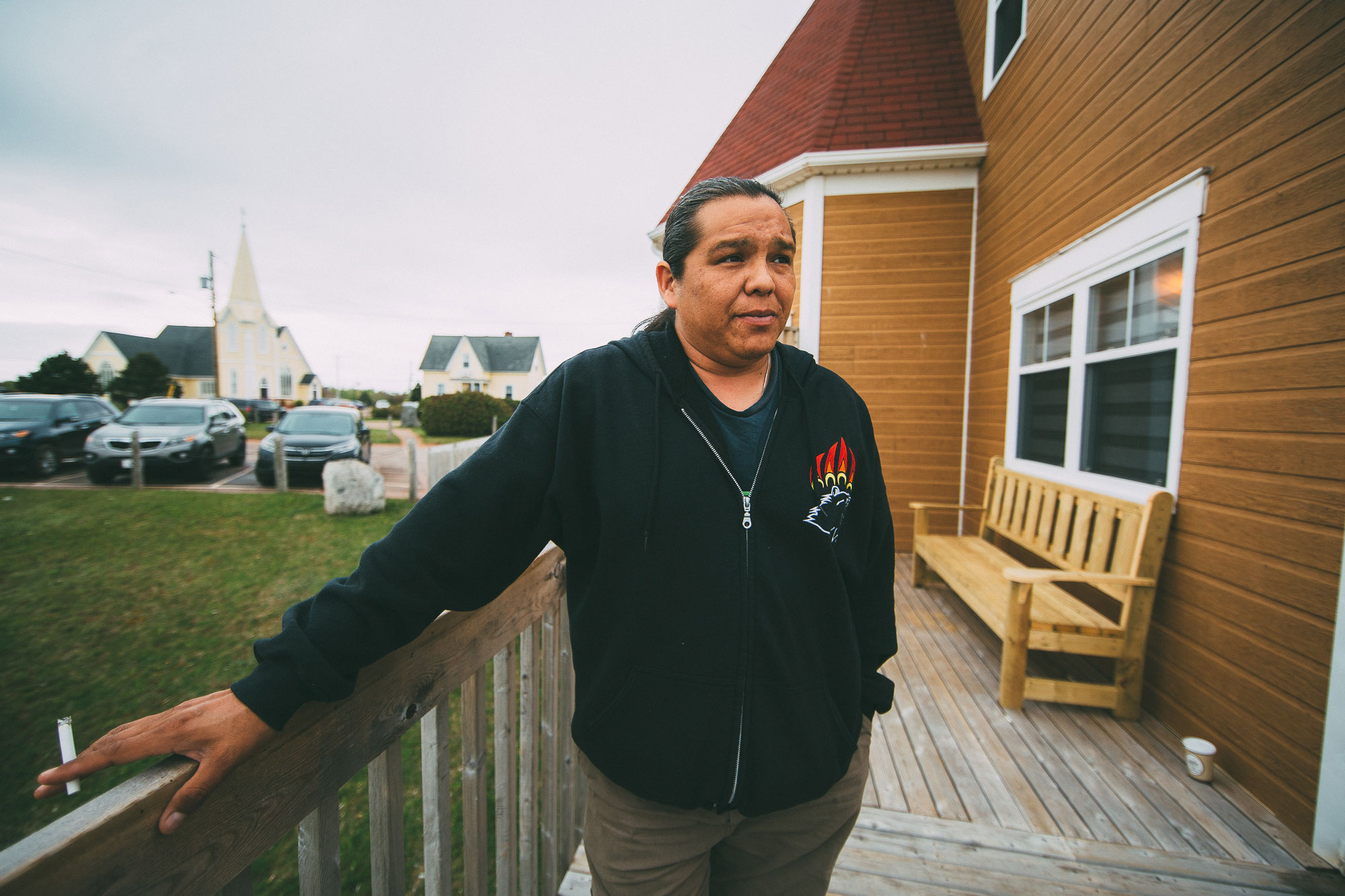We reached the band office in Lennox Island, a small building overlooking the waters of Malpeque Bay. The north coast of Prince Edward Island had been covered by low-hanging clouds all morning as we cycled to our meeting with Gilbert Sark, an Elder in Lennox Island First Nation. After chatting with the receptionist at the Band Council, Carol Anne, Jonathon asked for some scissors in order to make a tobaccoo offering for Gilbert.
“Who’s that for?” asked Carole Anne.
“We’re meeting with Gilbert Sark in a couple minutes, you probably know him…” Jonathon’s voice trailed off.
She had her eyebrows raised. “He’s right beside you.”
We laughed and shook hands with Gilbert, who had indeed walked up beside the counter. Jonathon was momentarily at a loss for words. “Pretend I’m not doing this,” he joked after a few seconds, referring to the last-minute preparation of the tobacco offering.
He waved his hand. “Of course. I’ll see you downstairs.”


The first thing we talked about was Gilbert’s current formal position in the Lennox Island Band Staff as the Comprehensive Community Planner. He showed us his past plan, which was completed in 2005 for the following decade. It was, in a word, comprehensive. A large binder covering subjects such as infrastructure, education, employment, tourism, health services, and so on, were documented as they were, along with their strengths and weaknesses. Ideas were laid out for the future, with detailed steps on how they would be achieved.
He’s currently in the consultation stage of a community plan for the next 25 to 50 years, and expects the preparation of the plan to take five years. “They just let their ideas flow, and every bit of information I get from them is put into a community plan.”
Our conversation shifted to climate change after Gilbert mentioned its influence in the community plan. He didn’t tell us this particularly story but Jonathon found an article about Lennox Island in which he describes one little kid’s answer to the question of what they see for their community in the next 25 to 50 years.
“Answer from one little kid was, ‘A bridge going nowhere,’ meaning our Lennox bridge. And there’s no Lennox Island.”
According to climate scientists, Lennox Island has already lost one square kilometre of land to rising sea levels in a single generation—parts of the coast where community members would gather traditional materials for ceremonies, as well as long-held burial grounds. It’s a loss that can’t really be enumerated, and a loss that grows more serious every year.
Gilbert talked about meeting with an Elder whose backyard was steadily washing away. “He’s been losing about two feet per year due to the erosion. On a storm surge he could lose two feet to four feet, depending on how rough the water is.”
Since we grew up in Ontario, we’d never heard of a storm surge. It came up in Jonathon’s research about how climate change is affecting Chéticamp, Nova Scotia, which is when we first understood its seriousness. A storm surge, put simply, is when the sea level swells due to low atmospheric pressure and high winds. A diagram we found from the National Oceanic and Atmospheric Administration put a storm surge 8.5 times higher than normal high tide. They’re a major focus of storm readiness on the Gulf of Mexico and Eastern Seaboard, and highly relevant to emergency response plans on Canada’s east coast.
When a storm hits Lennox Island, the community braces for the impact of the storm surge.
“When the storm comes in our fire department monitors the storm surge. You’ll see the Chief down at the wharf, you’ll see her down at the back of the island, you’ll see her at the bridge. She’ll just keep doing her rounds.”
The following is an excerpt from Jonathon’s journal following our meeting with Gilbert.
The complexity and inevitability of the consequences of climate change makes it a dispiriting subject at the best of times. On the shore of Lennox Island, I felt a sense of helplessness that went right to my core. I was sitting across from a man who was watching his traditional home be erased before his eyes. It wasn’t distant like Sub-Saharan Africa or the Pacific Islands. It was immediate. Present.
So, dispiriting. And I tried to share that a bit, but mostly kept it to myself. It couldn’t possibly be my place to kick the legs out from whatever tenuous hope and grim determination was keeping Gilbert’s voice steady. But I wondered. If I’ve barely got enough strength in my shoulders for secondhand stories, where did this community find its strength to hold their own?
“You’re not going to stop water, regardless. Erosion is going to happen. Water’s going to flow, it’s going to flow. So how much money do we keep throwing at it, in order to save our island?”
Gilbert spoke about possibilities of expansion to reserve land off Lennox, and we didn’t talk about it in detail but the First Nation has some land elsewhere on PEI. It felt inadequate, considering the fact that Indian reserves make up 0.2% of Canada’s land mass, as well as the fact that all of PEI is under threat from climate change.
He had no sense of bitterness or resentment, and spoke highly of the provincial government. “It’s not like the province backed us into a corner or anything like that. They have good relations with our governance here.”
“Our Chief is very passionate about the erosion. She’s had countless meetings with engineers, like she’s probably on the phone talking to someone about it right now. She’s very adamant about doing something to save Lennox.”
“I also do a lot of cultural stuff in the community,” said Gilbert, “doing prayers and openings, smudgings, stuff like that. I’m a drum maker. You could say I make all of our ceremonial items, our eagle fans, eagle staffs. Stuff like that.” He said from a young age, he found that he preferred spending time with Elders to hanging out with his friends.
“Because it was…basically finding out who you were as a person, like your background and your history and everything. What basically made you, you.”
Because he has spent so much time learning traditional teachings, many people in Lennox Island consider Gilbert an Elder. He doesn’t always agree with that entirely, particularly because he is still learning and spending time with the Elder who gave him many of his teachings. “I still don’t see myself as that,” he explained. “I still see myself as a student until I reach a certain age. I still feel like I haven’t climbed those ranks as fast as they think I did. If it was a school I’m probably still in grade nine. I haven’t graduated yet.”
Gilbert talked about taking the teachings his learned from his Elders and hosting workshops in which other community members—whoever wanted to learn—would be taught the knowledge and skills as well.
The amount of things that Gilbert had knowledge in felt impressive, but in his explanation they were matter-of-fact. “It’s just stuff that I’ve learned from other Elders, so I try to keep their teachings going.” The passing-on of teachings was something that he thought a lot about—something that he explicitly explained to those he taught.
“‘Who’s going to be making these drums after I’m gone? Do you guys remember in 2010 when my heart stopped,’ I said, ‘I died in my living room. If they didn’t start my heart again, who’s going to keep this drum group going? Who’s going to teach people how to make drums, or make fans, or do this or that.’ I said, ‘Would you guys?’ ‘Well we don’t fully know how to.’ I said, ‘That’s right, I’m going to keep teaching you until it’s in your head no problem, just like talking. You’re going to learn how to do these things.’”
When an Elder dies, Gilbert pointed out, you don’t just lose them. You lose their teachings. Unless someone else has learned.
As a drum keeper, you take care of the drum, and the drum group. “And in caring for the drum, you have to live a certain lifestyle. No drinking, no drugs. You have to try to live a positive lifestyle as much as possible. Help if you see that someone needs help. It’s a lifestyle not about self, it’s a lifestyle about everyone else.”
The drum that Gilbert takes care of belongs to Hey Cuzzins, the oldest drum group in PEI. The group began in 1991, after an Alcoholics Anonymous celebration. Gilbert was 13 years old. “A bunch of us got together and we said, we want our own drum group here. If we can learn how to do this and the teachings that go with it, we want this.”
“The group acts like a support group for those who are struggling with drugs and alcohol and stuff like that. Even in school, they would come to drum practice and before we’d even sit at the drum we’d help each other with our homework. They were very firm on no drinking, no drugs to sit at the drum. Through that, they kept each other straight, and sober. And they actually helped almost every one of them through school.”
Jonathon came across an article on CBC about the drum group. “Before I joined,” said one of the members, “I was in some dark times. I was going for depression. It pulled me out.” Once in a while, the article added, a group member may get into trouble, and the drumming group has gone to court to speak on their behalf. “They actually get it written in their probation order that they must attend drum practice,” said Gilbert, “and then we in turn make sure that they go.”
We asked about Canada moving forward, and Gilbert’s answer was simple: “Start listening to every background that’s out there. Stop thinking about the almighty dollar. Killing what’s left of our earth is not going to get us forward.”
“It’s time for Canada to wake up.”
We asked about Gilbert’s fears and hopes for the future, and again he responded simply, but his answer was intimately connected to his experience as an Elder, his mentorship through the drum group and his consultations about the rising sea levels threatening the island. You could hear it all in one sentence. “The only thing that I’m afraid of is that the key people that hold the teachings, they pass and no one picks it up. That’s what I’m afraid of.”
His hopes balanced his fears.
“I’m hopeful that our youth are going to pick up the reins, you know I’m hopeful that we’re going to actually leave something behind for them. I’m always hopeful for a better beginning than where we’re at. Or a better ending.”
As we wrapped up the conversation, Asad asked about his name, and we discovered that his spirit name was Raven. Asad asked about the story behind that and for the following ten minutes, we listened, spellbound, as he recounted how he learned of his name, his identity and his life’s purpose. It was such a powerful story that we’re not going to transcribe it or pull any quotes other than this piece from its beginning.
“My Elder and his wife called a medicine man, and in the phone call, Carol tells me, he goes, ‘This young fella, is he drumming?’ ‘Yeah.’ ‘He travels around a lot?’ ‘Yeah.’ ‘Has long hair?’ ‘Yeah he’s got long hair.’ He goes, ‘I’ll be there in two days. It’s about time I found this kid.’ And she goes, ‘What do you mean?’ He goes, ‘His spirit name is Raven. I gotta explain it when I get there.’”